
Italy may have dodged a 'pasta strike' but food inflation is still high. Here's why
Italians were supposed to be on a "pasta strike" this week but it was called off after prices for the national staple started to fall. Zoom out, though, and global food prices are still far higher than a year ago, despite precipitous drops in the cost of key raw materials.
2023-06-29 22:49
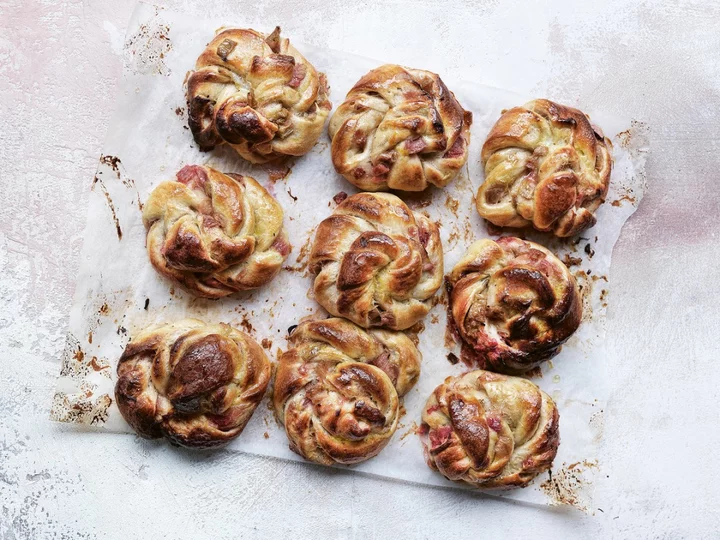
Rhubarb sticky buns for an idyllic Scandinavian afternoon tea
In Scandinavia, we are famous for our cinnamon and cardamom buns, made with a soft, yeasty dough,” says Trine Hahnemann, author of Simply Scandinavian. “I decided to try them with rhubarb in place of the spices, since it is a local vegetable for me. Just like the original, these buns are soft, sweet and sticky.” Rhubarb sticky buns Makes: 14-16 Ingredients: For the buns: 300g rhubarb 100g caster sugar 50g fresh yeast, or 10g fast-action dried yeast 200ml lukewarm whole milk 100g full-fat crème fraîche 1 egg, lightly beaten 650g strong white flour, plus more to dust 1 tsp sea salt flakes 100g salted butter, softened For the filling: 100g salted butter, softened 50g caster sugar 100g marzipan, grated Method: 1. Cut the rhubarb into one-centimetre pieces, place in a saucepan with 50 grams of the sugar and bring to the boil. Cook for five minutes, then drain through a sieve placed over a heatproof bowl. Return the juice to the pan, bring to the boil once more and cook down until you have a syrup. Leave to cool. 2. Dissolve the yeast in the lukewarm milk in a bowl, then stir in the crème fraîche and egg. Next, mix in the flour, the remaining 50 grams of sugar and the salt. Knead the butter, little by little, into the dough, then knead well on a floured work surface until smooth. 3. Put the dough in a bowl, cover with a tea towel and let it rise for one to two hours, or until doubled in size. 4. Make the filling by mixing the butter, sugar and marzipan into a smooth paste. 5. Line some baking sheets with baking parchment. 6. Tip the dough out on to a floured work surface and roll it into a rectangle measuring about 40 x 30 centimetres. Spread the filling evenly over half the dough, then arrange the cooked rhubarb pieces on top of the filling. Fold the plain side over the filled side, then cut across into two-centimetre strips. 7. Take each strip and twist it, then roll each twist into a spiral. 8. Place the rhubarb buns on the prepared trays, pressing down on each so they spread slightly. Cover and leave to rise for 30 minutes. 9. Preheat the oven to 180C/350F/gas mark 4. 10. Bake the pastries for 25-30 minutes, then remove from the oven and brush with the rhubarb syrup. Leave to cool on a wire rack before serving. ‘Simply Scandinavian’ by Trine Hahnemann (Quadrille, £27). Read More Budget Bites: Three light recipes that sing of summer What the hell is Scandinavian food? Lighter fish pie: Comfort food you won’t feel guilty for eating How to make Norwegian potato pancakes Three quick and easy plant-based fakeaways to create at home The Union Rye, review: Finally, a decent restaurant in this charming East Sussex town
2023-06-29 21:20
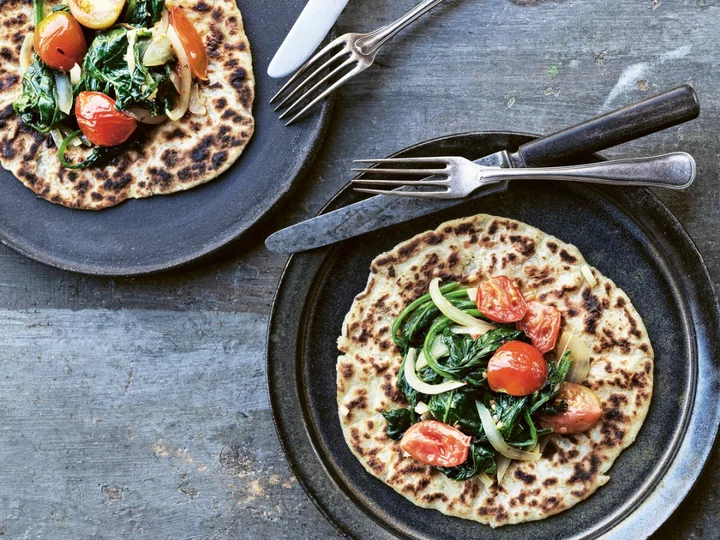
How to make Norwegian potato pancakes
A Norwegian tradition at weddings. In the old days, in small towns in Norway, all the women would gather together to make really big potato pancakes to be eaten at wedding breakfasts!” says Trine Hahnemann, author of Simply Scandinavian. “This recipe takes a little planning because you need to prepare the potatoes the day before to allow their starch to settle, in order to be able to roll out the dough.” Potato pancakes Makes: 10 Ingredients: For the pancakes: 500g peeled potatoes 50g salted butter 50g full-fat crème fraîche 1 tsp sea salt flakes 175g plain flour, plus more to dust Freshly ground black pepper For the topping: 200g spinach 4 tomatoes 1 onion, sliced 1-2 tbsp salted butter 2-3 tbsp full-fat crème fraîche Method: 1. The day before you want to make the pancakes, boil the potatoes until tender. Drain them, then pass through a potato ricer into a bowl and add the butter, crème fraîche and salt, with some pepper. Mix well, then cover and refrigerate overnight. 2. Next day, mix the flour into the potato mixture and divide the dough into 10. Roll each piece out on a floured work surface into a circle 12 centimetres in diameter. Cook each one in a dry frying pan, turning it once. You will know they are ready when they are light brown on both sides, which will take two to three minutes on each side. 3. For the topping, rinse the spinach in cold water and drain well; it may take several rinses to get it properly clean. Cut the tomatoes in half and discard the juice and seeds, then slice them. Sauté the onion in the butter until golden brown, then add the spinach and wilt it, seasoning to taste with salt and pepper. Turn the heat off, add the tomatoes and mix. 4. Serve the warm pancakes topped with the vegetables, with crème fraîche on the side. ‘Simply Scandinavian’ by Trine Hahnemann (Quadrille, £27). Read More Budget Bites: Three light recipes that sing of summer What the hell is Scandinavian food? Lighter fish pie: Comfort food you won’t feel guilty for eating Three quick and easy plant-based fakeaways to create at home The Union Rye, review: Finally, a decent restaurant in this charming East Sussex town Missing Glastonbury? Here’s how to have a festival feast at home
2023-06-29 19:17
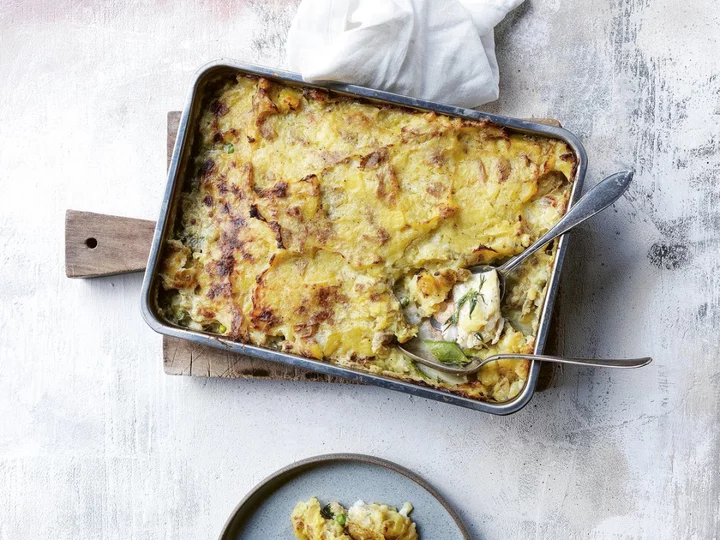
Lighter fish pie: Comfort food you won’t feel guilty for eating
The ultimate comfort food, but also light; this recipe manages to be creamy and filling without you having to take a nap afterwards, which can be the case with heavier meat dishes,” says Trine Hahnemann, author of Simply Scandinavian. “It can be made with any fish, or also with the same weight of vegetables instead. This kind of pie will always do it for me when I’m in need of energy and comfort.” Fish pie Serves: 6 Ingredients: 800g large potatoes, chopped into big chunks 100g salted butter, plus 3 tbsp, plus more for the dish 500g firm white fish fillet, chopped into small pieces 300g raw prawns, sustainably caught 10 white asparagus spears 10 green asparagus spears 2 shallots, finely chopped 200g shelled fresh peas 5 dill sprigs, chopped Sea salt flakes and freshly ground black pepper Leaves from 2-3 sprigs of flat-leaf parsley, chopped, to serve (optional) Method: 1. Boil the potatoes in water until tender. 2. Butter a large ovenproof dish generously, then add the chopped fish and prawns in an even layer. Season with salt. 3. Snap the lower one-third of the white and green asparagus off, then peel the white asparagus until shiny and cut all the asparagus spears into four-centimetre pieces. (The trimmings and peelings can be used in soup). Fry the shallots gently in a frying pan in one tablespoon of butter. Turn off the heat, add the asparagus, peas and dill, mix well and season with salt and pepper. Arrange the vegetable mixture on top of the fish. 4. Preheat the oven to 200C/400F/gas mark 6. When the potatoes are cooked, drain them, reserving 100 millilitres of their cooking water. Mash the potatoes lightly together with the reserved cooking water and the 100 grams of butter, keeping the mash chunky. Season to taste with salt and pepper, then spread the mash over the pie filling and place the remaining two tablespoons of butter, in small dots, on top. 5. Bake for 30 minutes. Let it rest for a few minutes, then scatter with parsley and serve. ‘Simply Scandinavian’ by Trine Hahnemann (Quadrille, £27). Read More Budget Bites: Three light recipes that sing of summer What the hell is Scandinavian food? Three quick and easy plant-based fakeaways to create at home The Union Rye, review: Finally, a decent restaurant in this charming East Sussex town Missing Glastonbury? Here’s how to have a festival feast at home Four berry sweet recipes that go beyond strawberries and cream
2023-06-29 17:25
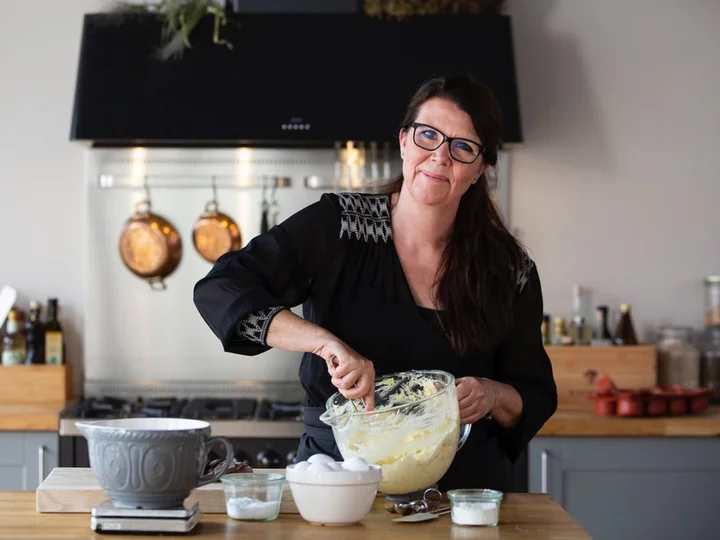
What the hell is Scandinavian food?
Danish pastries are world-famous, but what do you know about the rest of Scandinavian cuisine? With a food philosophy that centres around seasonal produce, perhaps the Scandi approach to cooking is the way forward when considering the environment and the cost-of-living crisis. “It’s very seasonal, lots of vegetables and very clean flavours,” Copenhagen-based chef and food writer Trine Hahnemann says of Danish cuisine. “So salt, pepper, nutmeg; salt, pepper, lemon; salt, pepper, vinegar – it’s not bland at all, we use spices, but we use them one at a time.” Hahnemann, 58, says this emphasis on seasonality helps save money. “It becomes too expensive to buy vegetables that are out of season, that are shipped or whatever,” she explains – but she’s all to aware that the Danish food scene is a bit of a paradox. She mentions produce “that have become everyday things, which people eat every day – like cucumbers, tomatoes and bananas. You can’t convince people there’s also a season for bananas – it’s year round, all the time. They’re the biggest fruit in Denmark”. This doesn’t stop Hahnemann advocating for eating the seasons – which in Denmark means you might be limited to root vegetables and potatoes in the winter. This isn’t necessarily a bad thing, particularly as we’re now coming into summer and there’s a glut of fruit and vegetables available. Summer cabbage, radish, fennel, tomatoes, cucumbers, courgettes, strawberries, tomatoes – they’re all in her shopping basket during this time of year. Hahnemann is a salad fan, and she’s devoted a whole section of her new cookbook, Simply Scandinavian, to them. The chef argues people “don’t take [salads] seriously enough” – and opening a bag from the supermarket won’t quite cut it. “Buy a few vegetables, bake them nicely in the oven with either lemon juice and a little bit of a spice of some kind – it could be garam masala, it could be garlic – then always have a nice dressing. Spend some money on some good oils or good vinegars, because that’s where the flavours are. “Then think about texture… Texture means a lot when we eat.” The moral of the story? “Salads are amazing, because there are no rules – anything can become a salad,” she says. Hahnemann learned traditional Scandinavian cooking from her grandmother, saying: “My favourite dish when I was little that my grandmother would cook for me was meatballs with the cucumber salad.” Her grandma ever explicitly taught her how to make this dish – Hahnemann was instructed to help out, and eventually learned classic Danish recipes through osmosis. “It was much later in my 20s I realised what an amazing gift she’d given me without ever asking if I wanted to be involved – because I was involved, but I was never asked to be part of the cooking. I just saw it all tasted it,” Hahnemann says. Not that feeding Hahnemann was much of a chore: “When I was a child I loved everything. The only thing I didn’t like was a well-done omelette, that was the only thing I couldn’t eat when I was little.” Hahnemann’s grandmother also taught her how to bake, drawing upon the traditional recipes Denmark is famous for. As a child, she practised baking while living on a commune with her parents in the Sixties and Seventies. “There was this idea that children, their creativity should be nurtured, you shouldn’t put limits on things. So I baked all these horrible cakes and the grown-ups would eat them and say, ‘Oh, it’s wonderful Trine’ – and it was nothing like that,” Hahnemann remembers with a laugh. It was only when someone in the commune started giving her tips on beating the butter and sugar before adding the rest of the ingredients that “all of a sudden this world opened up to me about baking”. Hahnemann still uses baking as a tool when she’s “really stressed out”, and has a bakery in Copenhagen putting the spotlight on traditional Scandinavian bakes like cardamom buns and rye bread. She says baking is “the most important thing” about Scandinavian cuisine. “Because of the rye bread, and the whole lunch concept of open sandwiches on the rye bread. The whole breakfast is about bread, then you have all the celebratory baked goods – that you can say we now eat on a more regular basis.” While Hahnemann accepts some “traditions are disappearing, because everybody’s working so much”, she’s keen to keep the spotlight on traditional buns, breads and baking. When she recently taught a baking class, she was “so happy” to have a group of male friends in their 20s sign up, saying: “I think it’s important to keep it alive.” ‘Simply Scandinavian’ by Trine Hahnemann (Quadrille, £27).
2023-06-29 13:53

What’s the Difference Between Ice Cream and Gelato?
You know it's summer when going to the local ice cream or gelato shop becomes part of your daily routine. But what exactly is the difference between these two frozen treats?
2023-06-29 05:19

‘This could get me in trouble’: Michelin chef comes up with controversial alternative to barbecuing burgers
Michelin-starred chef David Chang has poured cold water on the idea that grilling burgers on a barbecue is the optimum way to cook them. The founder of Momofuku Ko, which has two Michelin stars, said that barbecuing patties only serves to turn them into “carbonised crap”, but people keep cooking them like this because of the socialising that is associated with cooking outdoors. On his podcast The Dave Chang Show, the controversial chef suggested that using a griddle to cook burgers is a superior method. Chang, 45, said: “Grills suck for burgers. We have assumed as a culture that in summer, we eat a burger and it’s grilled. “I actually think the grill is a horrible thing for the burger… I think this viewpoint could get me in trouble,” he admitted, but pressed on with his argument against the grill. “The success rate of the griddle is better than the grill, and also there’s no clean up, you have nothing to worry about.” The Korean-American restaurateur continued: “A juicy burger is going to turn into a guaranteed grease fire [on a barbecue], why use it? This whole idea of imparting flavour from the grill, the only flavour that’s being imparted is the carbonised crap that’s on it. “You would need to cook a burger over charcoal for 12 hours to get that smoky flavour. “A backyard burger is an experience that you try to convince yourself is better than it actually is,” he claimed. “It’s the nostalgia, it’s the smells, it’s your friends. But if you actually take it out of the context, it’s not that good.” Chang went on to allege that the close relationship between burgers and grills “is a marketing lie”. “How many places where you think have a good burger, cook it on a grill?” he challenged. However, he did have some praise for barbecued foods. Chang said that grilling corn was “clearly the only champion” and he “can’t think of anything else” that makes corn taste quite as good. Chang has previously shared his opinions on burgers that landed him in trouble. In 2015, he provoked the ire of Australians when he wrote in his blog Lucky Peach: “You know who f***s up burgers more than anyone else in the world. Australians. Australia has no idea what a burger is. “They put a fried egg on their burger. They put canned beetroot on it, like a wedge of it. I am not joking you. This is how they eat their burger.” He also laid waste to the use of wagyu – beef that comes from cattle that is bred in Japan and is highly prized for its marbled fat content – in burgers. In his “burger manifesto”, Chang wrote that it was “the dumbest burger in the world” to use wagyu. “It’s like 70 per cent fat content – it’s disgusting. Would you eat a ground bacon burger? That’s what you’re doing with a wagyu burger,” he said. “Or the idiots that have ‘kobe beef wagyu sliders with a trio of ketchup’ on their menu – that drives me insane.” The chef is also known for speaking candidly about his toxic behaviour while working in kitchens in the past. In his 2020 memoir Eat a Peach, Chang wrote: “When I’m angry, I seethe with such intensity that it can’t simply be emotional. It’s like I’m an animal registering danger.” Hannah Selinger, an award-nominated journalist, wrote in her essay for Eater that “in all my years of restaurant work, I had never seen anything like the roiling, red-faced, screaming, pulsing, wrath-filled man that was David Chang”. She worked as corporate beverage manager at the Momofuku restaurant group in 2008. Chang responded to Selinger’s essay and said that while he didn’t recall specific incidents mentioned by her, “they are entirely consistent with my behaviour at the time, which I did not begin to correct until several years later”. He added that “the bottom line is that I’m sorry”. Apart from his podcast, Chang also hosted Netflix’s travel and food series Ugly Delicious from 2018 to 2020. The show aired two series and featured celebrity guests including Jimmy Kimmel and Nick Kroll. Read More Walk this way... but not like that: How men’s walks became sexualised Jonnie Irwin makes rare red carpet appearance as he says ‘every day is a gift’ Influencers face backlash for promoting Shein factory during PR trip in China Budget Bites: Three light recipes that sing of summer Danny Dyer explains why he has a Toby Carvery Platinum Gold Card Three quick and easy plant-based fakeaways to create at home
2023-06-28 16:51
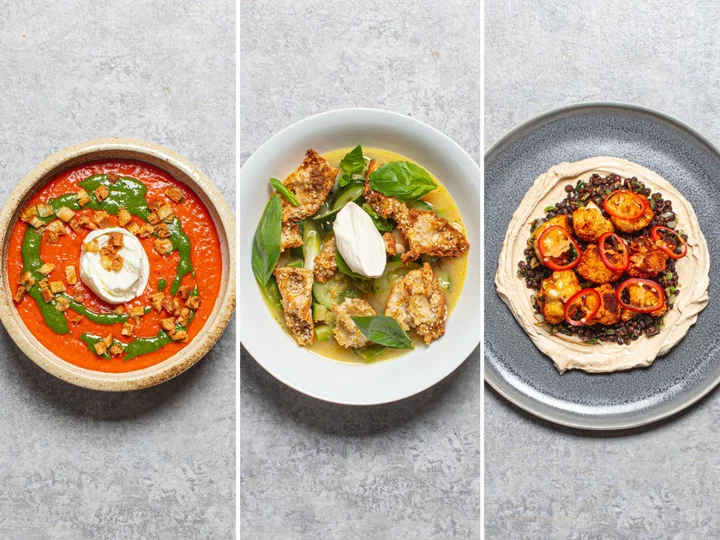
Budget Bites: Three light recipes that sing of summer
Make the most of all the season has to offer by chowing down on bell peppers, courgettes, cauliflower and asparagus across three wonderfully, light dishes that sing summer. As part of our Budget Bites column – where we’ve teamed up with Sorted Food to bring you easy, affordable, quick and (most importantly) tasty recipes once a month – we’ve brought you three seasonal dishes that make the most of your staple ingredients while keeping your fresh shopping list minimal. We’ve also provided a handy shopping list for the ingredients (though hopefully most of it will be knocking about already), which are used across all recipes to ensure minimal food waste. You just need to decide where to shop, whether it’s locally or online. Shopping list 9 cloves garlic 20g fresh ginger 30g fresh basil 4 red bell pepper 2 courgette 5 spring onions 200g asparagus 1 lemon 1 cauliflower 1 red chilli 5 spring onion 40g unsalted butter 150g mozzarella ball 300g crème fraîche 1 x 250g ciabatta 1 vegetable stock cube 2 tbsp miso paste ½ tsp ground cumin ½ tsp ground coriander seed 1 tbsp mild chilli powder 2 tbsp sesame seeds 10g pine nuts 400g tinned chopped tomatoes 400g tinned butter beans 250g microwave Puy lentils Olive oil Vegetable oil Sesame oil Red pepper soup with basil salsa If you can get your hands on Romano red peppers, give them a go – they will provide a little more sweetness. Serves: 2 Ingredients: 4 red bell pepper 4 cloves garlic 6 tbsp olive oil ½ ciabatta (1x 250g) 20g fresh basil 10g pine nuts 400g tinned chopped tomatoes 150g mozzarella ball Method: 1. Preheat: Preheat the oven to 180C. 2. Prep the peppers: Deseed and thinly slice 4 bell peppers, then peel and thinly slice 3 cloves of the garlic – we will use the other clove of garlic later. 3. Preheat the pan: Add 2 tbsp of the oil to a large saucepan and place it over a medium heat. 4. Fry the peppers and garlic: Once the oil begins to shimmer and loosen, tip in the peppers, garlic, and a pinch of salt. Fry for 12-15 minutes, stirring occasionally until soft and jammy. Get on with the rest of the dish in the next steps while you wait. 5. Prep the bread: Cut 1 ciabatta in half and wrap half in clingfilm – we will use this for another recipe in the pack if you haven’t used it already. Cut some of what remains into small 0.5cm cubes and rip the rest into bite-sized chunks. 6. Get ready to bake: Toss the small cubes with 1 tbsp of oil and a generous pinch of salt on a small baking tray. Spread everything out into an even layer on the tray. 7. Bake: Bake in the oven for 8-10 minutes, until deep golden brown and crisp. Get on with the rest of the dish in the next steps while you wait. 8. Assemble the salsa: Add the leaves from 20g of basil to a measuring jug, along with 10g of pine nuts, 3 tbsp of oil, and a generous pinch of salt. 9. Blend the salsa: Blend until smooth and pesto-like, then give the hand blender a rinse – we will need it later. 10. Add the tomatoes: Once the peppers are ready, add 1 x 400g tin of tomatoes and a generous pinch of salt. 11. Add the bread and simmer: Add the ripped up chunks of bread from earlier (not the small cubes), and 150ml of water. Simmer for a further 5-7 minutes, until the bread starts to break up – this will thicken the soup. 12. Wash up: While you wait for the bread to break down, crack on with a bit of washing up. 13. Blend: Once the bread has broken down a bit, take the pan off the heat and blend until smooth. Season to taste with salt and pepper. 14. Serve: Divide 1 x 150g ball of mozzarella between 2 serving bowls, then ladle over the soup. Spoon over the basil salsa, scatter over the crispy ciabatta, and dive in! Summer stew with dukkah croutons We use ground spices but if time is on your side, try toasting whole spices and then blending them to amp up the flavours! Serves: 2 Ingredients: 2 courgette 5 spring onions 200g asparagus 2 cloves garlic 400g tinned butter beans 1 vegetable stock cube 1 tbsp miso paste 40g unsalted butter ½ ciabatta (1x 250g) ½ tsp ground cumin ½ tsp ground coriander seed 2 tbsp sesame seeds 3 tbsp vegetable oil 100g crème fraîche 10g fresh basil 1 lemon Method: 1. Preheat: Preheat the oven to 180C, this will be for the bread later. 2. Prep the veg: Cut 2 courgettes in half lengthways, then cut them crossways at 1cm intervals. Cut 5 spring onions in quarters crossways, then repeat with 200g of asparagus. Peel and finely grate 2 cloves of garlic. 3. Assemble the stew: Add the courgettes, spring onions, and garlic to a medium saucepan along with 1 undrained 400g tin of butter beans, 1 stock cube, 1 tbsp of miso, and 40g of butter. 4. Get the stew on: Add 400ml of water, then place the pan over a high heat. 5. Simmer: Once the stew comes up to a boil, reduce the heat to medium and simmer for 4-5 minutes, until the courgettes soften slightly. Get on with the rest of the dish in the next steps while you wait. 6. Prep the bread: Cut 1 ciabatta in half and wrap half in clingfilm – we will use this for another recipe in the pack if you haven’t used it already. Rip what remains into bite-sized chunks and add them to a medium baking tray. 7. Get ready to roast: Toss the bread with ½ tsp of cumin, ½ tsp of ground coriander seed, 2 tbsp of sesame seeds, 3 tbsp of oil, and a generous pinch of salt. Spread everything out into 1 even layer. 8. Bake: Bake in the oven for 8-10 minutes, until deep golden brown and crisp. Get on with the rest of the dish in the next steps while you wait. 9. Add the asparagus: Once the courgettes have softened slightly, add the asparagus and simmer for a further 4-5 minutes, until the asparagus is soft but still has a slight bite. Crack on with a bit of washing up while you wait. 10. Season: Once the stew is ready, finely grate over the zest from 1 lemon, then season to taste with its juice and salt. 11. Serve: Divide the stew between bowls and spoon over 100g of crème fraîche. Finish with the leaves from 10g of basil and tuck in! Chilli roast cauliflower with ‘holy trinity’ lentils The “holy trinity” in this dish refers to a wonderful combination of spring onion, ginger and garlic that is often used throughout Chinese cookery. Serves: 2 Ingredients: 1 cauliflower 2 tbsp vegetable oil 1 tbsp mild chilli powder 200g crème fraîche 1 tbsp miso paste 5 spring onion 3 cloves garlic 20g fresh ginger 2 tbsp sesame oil 250g microwave Puy lentils 1 red chilli Method: 1. Preheat: Preheat the oven to 180C – this will be for the cauliflower later. 2. Prep the cauliflower: Cut the green leaves from 1 cauliflower, then use a small knife to cut small florets from the woody stalk in the centre. We won’t be using the stalk or the leaves for this recipe, but they work well in soups! 3. Get ready to roast: Toss the florets with 2 tbsp of vegetable oil, 1 tbsp of mild chilli powder, and a generous pinch of salt on a large baking tray. Ensure the florets are fully coated, then spread everything out into 1 even layer. 4. Roast: Roast in the oven for 20-25 minutes, until golden in places and soft throughout. Get on with the rest of the dish in the next steps while you wait. 5. Mix the creme fraiche and miso: Beat 200g of creme fraiche with 1 tbsp of miso paste in a small bowl and set aside – we will use this for garnish later. 6. Chop chop: Finely chop 5 spring onions, then peel and mince 3 cloves of garlic and 20g of ginger. 7. Preheat the pan: Add 2 tbsp of sesame oil to a large frying pan and place it over a medium-high heat. 8. Fry: Once the oil starts to shimmer and loosen, add the spring onions, garlic and ginger. Fry for 3-4 minutes, until fragrant and golden in places. 9. Add the lentils: Add 1 250g pouch of lentils to the pan and fry for a further 4-5 minutes, tossing regularly, until piping hot. Crack on with the rest of the dish in the next steps while you wait. 10. Prep the chilli: Thinly slice 1 red chilli – we will use this for garnish later. If you are still waiting for the lentils, now would be a great time to do a bit of washing up! 11. Serve: Spoon the miso creme fraiche onto plates and spread it out into large discs. Divide the lentils between the plates and add the roast cauliflower. Scatter over the red chilli and serve! In response to the rising cost of living, we have teamed up with Sorted Food to bring you easy, affordable, quick and (most importantly) tasty recipes once a month. Find out more about Sorted and their nifty meal-planning app Sidekick at sortedfood.com/sidekick. Read More Three quick and easy plant-based fakeaways to create at home The Union Rye, review: Finally, a decent restaurant in this charming East Sussex town Missing Glastonbury? Here’s how to have a festival feast at home Four berry sweet recipes that go beyond strawberries and cream Can you whip up the perfect burger in just five minutes? These are the viral TikTok recipes you have to make this Father’s Day
2023-06-28 14:27

Danny Dyer explains why he has a Toby Carvery Platinum Gold Card: ‘I love it in there’
Danny Dyer has revealed that he is the proud owner of a loyalty card to Toby Carvery. The former EastEnders star, 45, said he has a “platinum gold card” for the roast dinner restaurant chain, but admitted that he does have a pet peeve when visiting. Speaking on the latest episode of Kathy Burke’s podcast Where There’s A Will There’s A Way, Dyer admitted that people who have an exclusive Nando’s “black card” were “cool”, but he was pleased with his Toby Carvery card. “I’ve got a platinum gold card, I don’t know why,” he told Burke. “I go in now and again, I don’t know what they’ve heard. Some people get the black Nando’s card, that’s the cool one, but I’ve got the f***ing Toby Carvery gold f***ing platinum card. So I’m going there when I want, and I have what I want.” He added that he “loves it in there”, before continuing: “If [Toby Carvery] are listening, I don’t want to lose the card so I’m not taking the piss but there’s something about standing there with your f***ing plate, there’s a geezer in front of you and I can see the taters I want and I can see he’s looking at the same f***ing taters.” Only a select few people are lucky enough to receive a Toby Carvery gold card. It is unclear if the restaurant chain has a “platinum gold” card, as claimed by Dyer, but a handful of other celebrities have posted on social media about getting their hands on one of the special cards. It has been claimed that the cardholder is entitled to free all-you-can-eat roast dinner when they visit a Toby Carvery branch. These include Geordie Shore star Chloe Ferry, who got one in 2019; The Chase star Mark Labbett, who is said to have won over his girlfriend Hayley Palmer with his gold card; Olympian hockey player Samantha Quek; and The Circle star Freddie Bentley. When asked how people can get the elusive gold card, Toby Carvery has kept the secret close. On social media, customer service representatives have told members of the public that they can “neither confirm nor deny the Gold Card exists”. In reply to one person who asked what they “need to do” to get a gold card, Toby Carvery replied coyly: “Gold card? Afraid we don’t know anything about that!” The Independent has contacted Toby Carvery for comment. Elsewhere in the podcast, Dyer also opened up about seeing his daughter Dani Dyer taking part in Love Island. Dani, 26, appeared in the fourth series of the ITV dating reality show in 2018 and won alongside partner Jack Fincham. Dyer said he had never watched Love Island before his daughter entered the villa and admitted that they had “a little row over it” because he “didn’t want her to do it”. “She wanted to be an actor and I was going, ‘Babe, listen, f***ing hell’ and then off she went,” he said. “I sat back and watched it, me and my Mrs, sobbing me heart out every night. I’m a very emotional man, a very sensitive soul. So watching her, she was unbelievable in it. She couldn’t put a foot wrong, she won it from day two. It makes me proud that she come out of my b*****ks, Kath.” Dyer recently became a grandfather for the second time after Dani welcomed twin girls in May with boyfriend Jarrod Bowen. She is also mum to two-year-old son Santiago, who she shares with former partner Sammy Kimmence. Read More How dogs became my greatest adversary on the dating scene Influencers called out for visiting and promoting Shein’s factory in China Paralympian Ellie Simmonds reveals she was adopted as she reconnects with birth mother Three quick and easy plant-based fakeaways to create at home The Union Rye, review: Finally, a decent restaurant in this charming East Sussex town Celebrity chef bans vegans from his restaurant ‘for mental health reasons’
2023-06-27 23:24

Chew on These 11 Impressive Competitive Eating Records
Pop a Tums and read about some of the most impressive competitive eating records ever broken.
2023-06-27 01:17

Why cities want to ban new drive-thrus
America is a land of drive-thrus.
2023-06-24 21:47

Food: Bangor researcher helps saves crucial Nepalese rice crop
The high-altitude rice variety in South East Asia is threatened by a major plant disease.
2023-06-23 23:54
